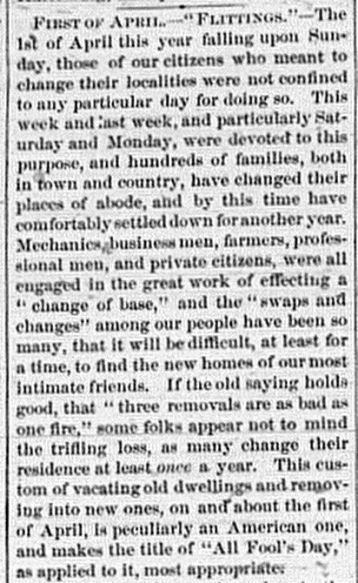April 1 was known as “flitting day” in Pennsylvania. It was the day when yearly leases expired, and tenant farmers,1 businessmen, mechanics and private citizens either renewed their leases for another year and “stayed put,” or they moved.
Local newspapers usually ran a column or two about the “flittings,” noting the changes in location of hotel keepers and businessmen and musing on the day in general. The editor of Carlisle’s American Volunteer waxed emotional about “flitting day” in his column on April 5, 1866.2
“The first of April has come and gone, with all of its changes, its joys and sorrows. Very different were the emotions with which its coming was looked for by one and another. Here a little household were preparing to leave the old homestead, where the voices of the loved and the lost still reechoed, and the patter of the little feet, long since laid under the sod, still was heard. To them moving day was the breaking up of all the tender memories of the past—It was the severing of a link in the chain of their lives. Then, there were happy young hearts, in the flush of love and health, just entering life, full of bright hopes for the future—all the gay pictures of youthful fancy and imagination hung up before them…”
In the March 20, 1875, edition of the Shippensburg News, the editor wrote that "Moving day with all its horrors will soon be upon us." He thought that April 1 was a bad day for moving. The weather was usually bad, the roads "hub deep," and it was usually raining. He said, "The bare idea of a first of April flitting is enough to deter any right-minded young man or woman from ever committing matrimony."
In an April 3, 1879, column3 about this annual occurrence, the editor of Carlisle’s Evening Sentinel thought that setting aside a specific day for “flitting day” was an ancient custom that should be done away with. Describing “flitting day” in Carlisle that year, he wrote, “At an early hour people from the rural districts and neighboring towns began to arrive…” and the streets “presented a lively appearance.” Carlisle Deposit and the Farmers Bank both “transacted a large amount of business,” and the public schools were closed so the children could “assist at the flittings.”
Flitting Day occurred on different days in different locations. For example, in Boston and New York leases expired on May first, so that was their “flitting day.” In Scotland and northern England, “flitting day” was on May 25. Other countries had their version of “flitting day,” but the custom gradually died out in the twentieth century.


